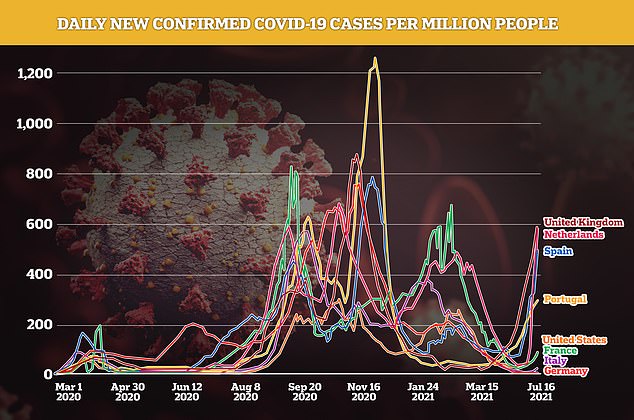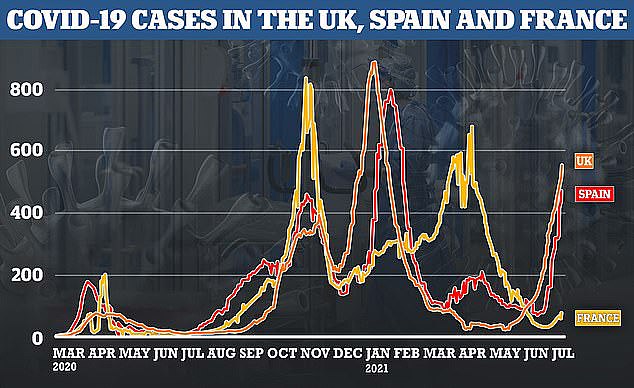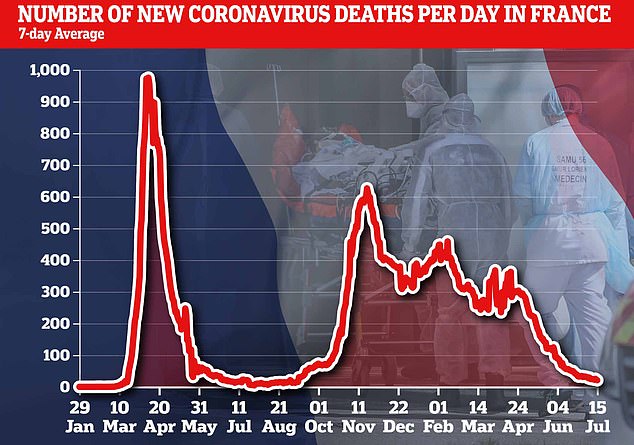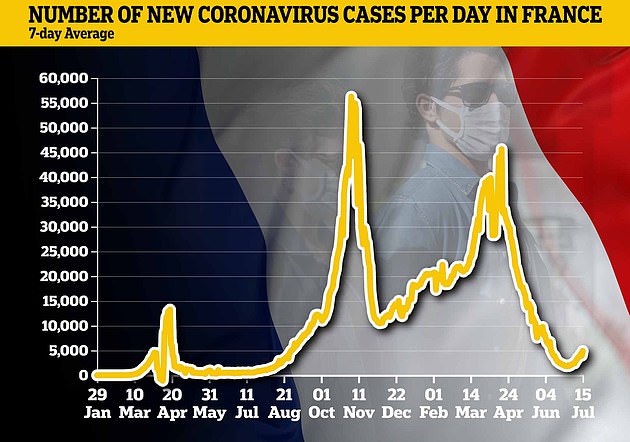Spain could be the next big holiday destination to be put on the so-called ‘Amber Plus’ list, travel experts fear.
The popular summer holiday destination, which attracted around 18 million UK visitors each year before Covid, may follow France on to the list.
It means Britons will still have to self-isolate when they return to the UK from Spain and France even if they have been double-jabbed.
The Government is set to lift the 10-day home quarantine requirement for fully vaccinated Britons returning from Amber List countries from tomorrow.
But in an unexpected twist, the Department for Health and Social Care (DHSC) announced on Friday night that the rule will not apply to France.
France, which has a significantly lower case rate than the UK, retaliated last night by tightening its Covid restrictions for those entering from Britain.
Now experts fear that Spain, as well as Greece, Germany, Belgium and the Netherlands, could also join France on the list – unofficially dubbed ‘Amber Plus’.
It comes as Britons have today been seen making a dash for the airports on the Balearic Islands, which are set to move from Green to Amber at 4am on Monday.
Speaking about possible changes, Paul Charles, chief executive of travel consultancy The PC Agency, told i: ‘It is now known as an amber plus list, whether they like it or not.
‘France is one of the big three countries we visit each year and I think the concern is the Government will be looking at Spain and Greece and potentially add those to the amber plus category.

Spain could be the next big holiday destination to be put on the so-called ‘Amber Plus’ list, travel experts fear. Pictured: Passengers return to Manchester Airport today from Ibiza ahead of the 4am change from Green to Amber

The Government is set to lift the 10-day home quarantine requirement for fully vaccinated Britons returning from Amber List countries from tomorrow. Pictured: British holiday makers queue at the airport in Ibiza ahead of the travel list changes

It comes as Britons have today been seen making a dash for the airports on the Balearic Islands, which are set to move from Green to Amber at 4am tomorrow morning. Pictured: British tourists arrive from Ibiza to Manchester Airport today


The summer holiday plans of thousands lie in ruins this morning, with people cancelling their planned trips to the Balearic Islands after they were axed from the green list while the cost of flights back from Ibiza, Majorca and Menorca soared nine-fold after last night’s announcement
Families set to cross the Channel fear their holidays will be cancelled at the last minute – as 500,000 Britons already there face hotel quarantine
Ministers are considering placing France on the ‘red list’ of countries – a move that would bring chaos and misery for 500,000 Britons estimated to be holidaying in the country this weekend.
The plan is being pushed by influential No 10 advisers – led by Jonathan Van-Tam, Deputy Chief Medical Officer for England – who fear the South African, or Beta, variant that is spreading in the country could evolve to evade vaccines.
The move would theoretically force returning travellers to pay £1,750 for ten days of quarantine in a hotel on their return.
The threat comes as thousands of devastated families cancelled their holiday plans yesterday after Ministers announced that double-jabbed Britons will still have to quarantine on their return from France after ‘Freedom Day’ tomorrow.
There was fury after it emerged late on Friday that France would be excluded from plans to lift quarantine rules for countries on the amber travel list.
But The Mail on Sunday has learned senior scientific and medical advisers want Ministers to go further and move France to red.
The suggestion was first raised at a top-level meeting at No 10 on Tuesday and was still being considered last night.
Ministers were presented with data that the South African variant is spreading rapidly in France and accounted for one in ten of all new infections.
There were also alarming warnings from some scientists that the AstraZeneca vaccine is less effective in protecting against the South African variant than other strains of the virus.
Despite the threat of the variant, thousands of anti-vaccine protesters mobbed Paris yesterday.
Only 1,073 Beta cases have been confirmed in the UK so far, compared with 216,249 cases of the Indian – or Delta – variant which took hold earlier this year.
A Government source last night said: ‘If the Beta variant continues to spread it [France] will have to go red. We can’t have it taking hold over here.’
Advertisement
‘I think we may see further changes as countries see higher infection rates.’
Meanwhile, Tim White, a data analyst, warned that the Benelux countries, and Germany, could also be at risk.
He said Luxemborg in particular had a ‘very high incidence of the Brazilian (Gamma) variant.
He wrote: ‘Belgium, Netherlands and Germany must be at risk too, low incidence of variants in previous data, but could change.
‘The obvious worry is for high infection regions like Spain and Greece – I’ve already had so many questions about this. The problem is (as usual) transparency. We have no idea if this category is only for variants of concern (VOCs) or high-incidence only.’
The comments come as Britons were today seen making a mad dash to Ibiza airport ahead of the change in quarantine rules for the Balearic Islands.
The archipelago, which also includes Mallorca and Menorca, is going from the Green List to the Amber List from 4am on Monday morning.
The move comes after a spike in Covid cases, meaning the islands have a higher case rates than some red list countries.
The case rate has rocketed to 519 per 100,000 residents over the past 14 days, which is lower than Red List Turkey’s 82 per 100,000 case rate.
Meanwhile, it was today revealed that ministers are considering placing France on the ‘red list’ of countries – a move that would bring chaos and misery for 500,000 Britons estimated to be holidaying in the country this weekend.
The plan is being pushed by influential No 10 advisers – led by Jonathan Van-Tam, Deputy Chief Medical Officer for England – who fear the South African, or Beta, variant that is spreading in the country could evolve to evade vaccines.
The move would theoretically force returning travellers to pay £1,750 for ten days of quarantine in a hotel on their return.
The threat comes as thousands of devastated families cancelled their holiday plans yesterday after Ministers announced that double-jabbed Britons will still have to quarantine on their return from France after ‘Freedom Day’ tomorrow.
There was fury after it emerged late on Friday that France would be excluded from plans to lift quarantine rules for countries on the amber travel list.
But The Mail on Sunday has learned senior scientific and medical advisers want Ministers to go further and move France to red.
The suggestion was first raised at a top-level meeting at No 10 on Tuesday and was still being considered last night.
Ministers were presented with data that the South African variant is spreading rapidly in France and accounted for one in ten of all new infections.
There were also alarming warnings from some scientists that the AstraZeneca vaccine is less effective in protecting against the South African variant than other strains of the virus.
Despite the threat of the variant, thousands of anti-vaccine protesters mobbed Paris yesterday.
Only 1,073 Beta cases have been confirmed in the UK so far, compared with 216,249 cases of the Indian – or Delta – variant which took hold earlier this year.
A Government source last night said: ‘If the Beta variant continues to spread it [France] will have to go red. We can’t have it taking hold over here.’
Earlier, Professor John Edmunds, from the London School of Hygiene and Tropical Medicine and a member of the Scientific Advisory Group for Emergencies (SAGE), told the BBC: ‘There is some good evidence from South Africa that it [the Beta variant] can evade the immune response generated by the AstraZeneca vaccine more efficiently.’
But many, such as French MEP Véronique Trillet-Lenoir, say the UK’s mandatory quarantine policy is based on a misinterpretation of health data.
She told Radio 4’s Today programme that the Beta variant is ‘not present at all’ in mainland France – experts say its incidence is estimated to be at just 3.5 per cent and falling – with the country’s cases mainly being found in overseas territories such as the island of Reunion in the Indian Ocean.




Also, the European Centre for Disease Control says the variant is more common in Spain and Greece.
Moving France to the red list would effectively destroy the summer holiday plans for millions of Britons and inflict further pain on the beleaguered tour operators.
The cost for one adult in a quarantine hotel is £1,750, with any subsequent adult or child over the age of 12 charged another £650.
The cost for children aged five to 11 is £325. There would also be a lack of accommodation as there are understood to be only about 20,000 hotel rooms available.
France is the UK’s second most popular holiday destination with more than nine million visitors in 2019.
It is also the most popular country for British second homeowners. There would also be logistical and diplomatic issues if France was added to the red list.
‘We’re furious to be forced to return early. We waited so long for this trip’
By Andrew Chamberlain and Peter Henn
Holidaymakers last night voiced their frustration as they returned to Britain after being forced to cut short their trips to the Balearic islands to avoid new quarantine rules.
Ibiza, Majorca, Menorca and Formentera will move from the green to the amber list of destinations at 4am tomorrow, meaning those who have not been double vaccinated will have to self-isolate for up to ten days.
Web designer Ella Sharples and her boyfriend Ryan Grogan had to cut short their two-week break in Ibiza. Arriving at Manchester Airport yesterday, Ms Sharples, 23, from Newcastle, said: ‘I’m angry because we have waited so long for this holiday and we have had to come back four days early. I’ve not been doubled-jabbed and I was told by work I wouldn’t be able to isolate, so we had no option.
‘It has cost nearly £300 to change the flights. We didn’t book to go until Ibiza was on the green list and now it’s going back to amber. It’s the uncertainty that is the worst aspect of it.’
Another passenger arriving at Stansted Airport said he had intended to spend three months in Ibiza, but the decision to move the island on to the amber list had reduced that to a month. ‘We were going to stay for 90 days but then they brought in the new restrictions, so we thought we had better come home,’ he said.
The Balearics, visited annually by 3.8 million Britons, were only put on the green list three weeks ago, but demoted again on Wednesday after cases doubled.
However, despite the imposition of the new restrictions, many appeared to have decided to stay on the islands and endure self-isolation when they return.
Returning from Majorca on schedule, Linda Holgate, 62, from Harrogate in North Yorkshire, yesterday said: ‘It’s a real shame for the hospitality trade over there because they are taking every possible step to ensure we were as safe as possible.’
Advertisement
The UK is reliant on France for food and medical supplies and the sheer number of entry points via air, road and sea would create challenges.
Travel expert Gemma Antrobus, of the Association of Independent Tour Operators, said: ‘The ability to put in hotel quarantines at those points or arrange logistics around them is possibly the reason why it didn’t hit red straight away.’
Holidaymakers and tour operators reacted with fury to the 11th hour change of travel rules to France – while eyebrows were raised across the Channel given the contrast in case numbers. In the seven days to July 14, there were 244,691 Covid-19 cases in the UK, compared with 27,713 in France.
The French government announced yesterday that it will require people arriving from the UK who are not double vaccinated to show a negative Covid-19 test taken within the previous 24 hours.
Previously, UK arrivals had been allowed to show a negative test taken within the last 48 hours.
An estimated 500,000 Britons are either in France or due to travel to, or through, the country within the next few days.
John Keefe, from Eurotunnel, which runs the Shuttle operation for cars between Folkestone and Calais, said: ‘This will ruin summer for many people. It is disappointing that the Government has cancelled the option of quarantine-free travel for double-vaccinated parents and their families so close to the school holidays and so soon after they had confirmed that travel to France was safe.’
Willie Walsh, director-general of the International Air Transport Association, said: ‘The Government is making life impossible for people who are desperate to see friends and family.
‘They promised freedom on the back of a successful vaccine programme and now pull the rug out from people at the 11th hour.’
From tomorrow, motorists passing through France in transit to the UK from Belgium, Germany or elsewhere will be regarded as arriving from France – and subject to quarantine when they reach Britain.
Eurostar rail passengers from Brussels, Rotterdam and Amsterdam to London St Pancras will be unaffected because the train passes through France without stopping.
Stephen Gee, who runs a chalet business in the French Alps, had extended his holiday because he thought he would escape having to quarantine if he came back tomorrow.
Instead he found himself having to rush back yesterday.
He said: ‘To change the rules on a Friday evening when no one has a chance to change anything very quickly for something happening on Monday is unbelievable.’
While travel firms can legally say they are still able to offer the holiday as booked and the fact that travellers must self-isolate is not their problem, in reality most airlines, ferry firms and tour operators are likely to offer flexibility with the chance to postpone the trip. Few will offer full refunds.
The Foreign Office does not warn against travel to France, meaning standard travel insurance policies will still be valid but it is unlikely that insurers will pay out for the additional costs such as extra tests and lost wages.
Source link : https://www.dailymail.co.uk/news/article-9799741/Spain-follow-France-amber-plus-list-travel-experts-warn.html












